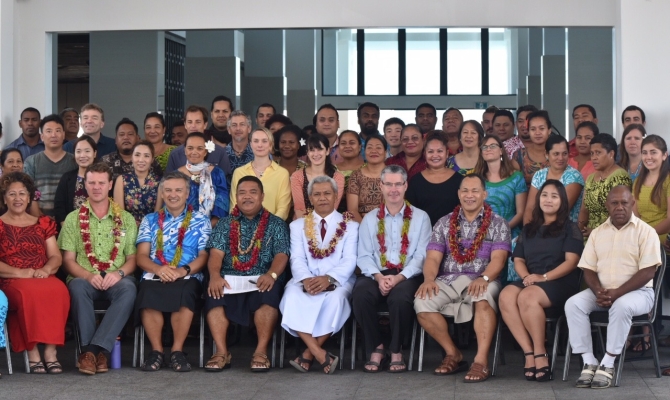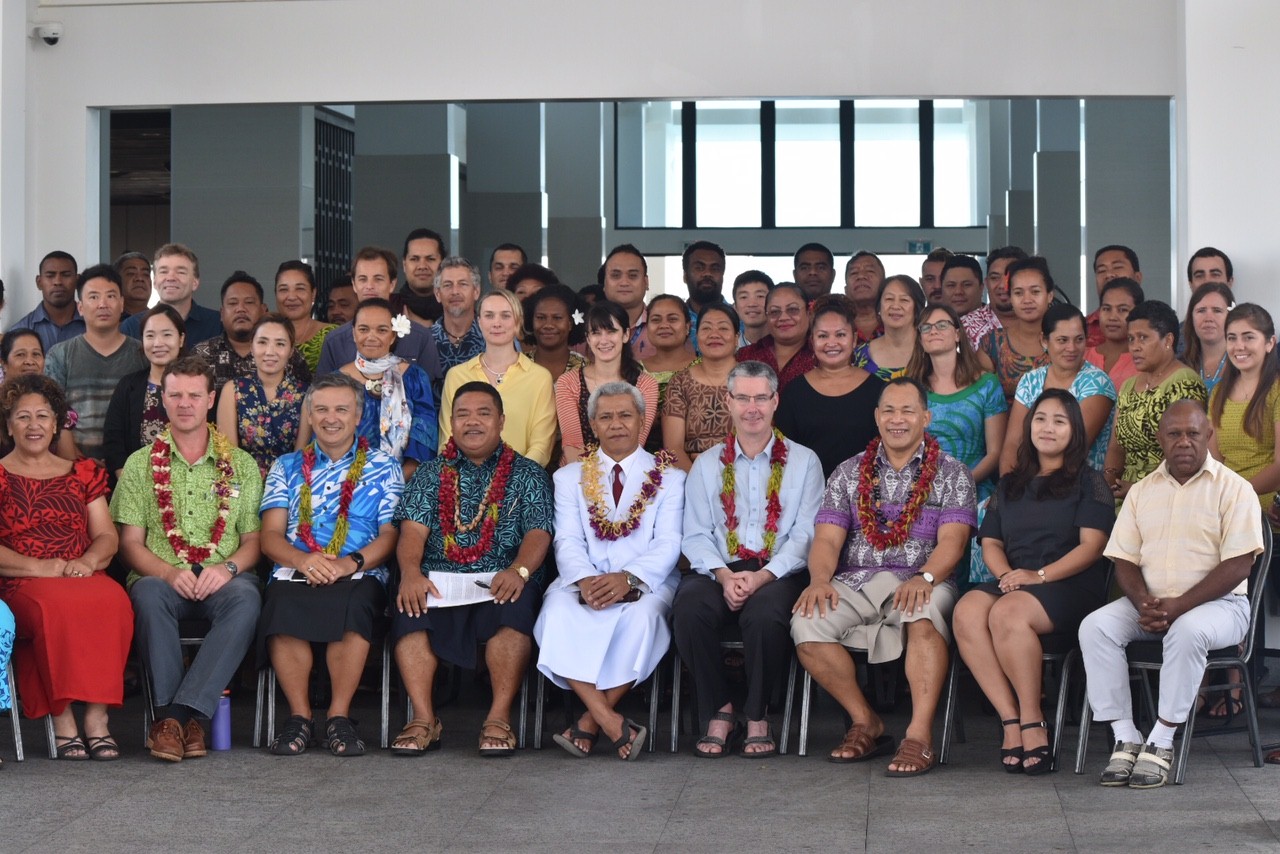
Climate Change Resilience
Our weather and climate can impact our public health in the Pacific region: more rain can lead to higher chances of mosquitos and the illnesses they bring, less rain can lead to hygiene problems leading to possible illnesses. And on it goes.
Being several steps ahead of the possible health impactsfrom our weather and climate is the Third Pacific Islands Climate Outlook Forum (PICOF-3) that opened in Samoa today. The meeting brings together Pacific regional meteorological and health sectors to plan and prepare for what will be forecast ahead in an attempt to alleviate the health impacts.
"The timing of the Forum is unique, recently there has been abnormal rainfall during our dry season and a few months ago a number of dengue fever cases were reported. There are predictions for a weak La Nina later in the year and the tropical cyclone season is also a few weeks away," said the Associate Minister for the Ministry of Natural Resources and Environment, Hon. Lemalu Lemi Taefu, at the official opening of the PICOF-3.
"I call on your meeting to discuss and suggest recommendations through a regional statement on relevant actions that governments in the region can implement to curb and mitigate the adverse implications of these phenomenon in all levels of society."

Participants' group photo at the Third Pacific Climate Outlook Forum at Taumeasina Island Resort, Samoa.
Photo: S.Seuseu/SPREP
PICOF is a platform coordinated by the Secretariat of the Pacific Regional Environment Programme (SPREP) in partnership with World Meteorological Organization and the Pacific Met Desk Partnership. It brings national, regional and international climate experts together to produce regional climate forecast information based on input from National Meteorological Services, regional institutions and Global Producing Centres of climate predictions.
It also provides an opportunity for experts on climate and health services to discuss the development, tailoring, uptake application and communication of climate information to ensure it is relevant and useful.
The first PICOF three years ago focussed on the impact on the water sector, last year PICOF-2 brought together the meteorological services and the disaster preparedness experts. This week the focus is on the health services in the Pacific.
"Some of the specific objectives of PICOF-3 include identifying the needs of the Health sector for climate services, discussing opportunities for integrating climate change information for health services and how representatives from the sector are using or may use the guidance of climate information," said Mr Sunny Seuseu of the Pacific Meteorological Desk at the Secretariat of the Pacific Regional Environment Programme (SPREP).
"It's also to provide a platform through the PICOF for stakeholders to share and exchange experiences and knowledge on wet or tropical season and its prediction."
The Climate Technical Meeting preceded the PICOF-3, and saw the regional NMHSs compare the various seasonal climate forecast guidance of the Pacific region, and discuss how these are produced in terms of accuracy, utility, weaknesses and strengths of the regionally produced guidance, as well as comparing and refining national level consensus-based climate outlooks for the upcoming season.
The NMHSs also discussed how they are currently accessing and assessing the available climate forecast guidance, making them nationally-relevant, and disseminating them to users.
A draft Regional Statement on the 2017/18 Climate and Tropical Cyclone Outlook for the Pacific islands and the Potential Impacts on Human health was also discussed and developed from the Climate Technical Meeting, this will be released once the PICOF-3 is complete.
The Third Pacific Islands Climate Outlook Forum (PICOF03) is being held at Taumeasina Island Resort from 27 – 29 September, 2017. The PICOF-3 is supported by Government of Samoa, Government of Australia, Climate and Ocean Support Program, Government of Korea, Republic of Korea-Pacific Islands Climate Prediction Services Project, Environment and Climate Change Canada, World Meteorological Organization, United Nations Development Program, Disaster Resilience for Pacific SIDS (RESPAC) project, Australian Bureau of Meteorology, National Institute of Water and Atmospheric Research, APEC Climate Center, National Oceanic and Atmospheric Administration, Meteo-France, Meteorological Services Singapore, Pacific Community, International Federation of the Red Cross, World Health Organization Samoa Office and Ministry of Natural Resources and Environment Samoa.
Being several steps ahead of the possible health impactsfrom our weather and climate is the Third Pacific Islands Climate Outlook Forum (PICOF-3) that opened in Samoa today. The meeting brings together Pacific regional meteorological and health sectors to plan and prepare for what will be forecast ahead in an attempt to alleviate the health impacts.
"The timing of the Forum is unique, recently there has been abnormal rainfall during our dry season and a few months ago a number of dengue fever cases were reported. There are predictions for a weak La Nina later in the year and the tropical cyclone season is also a few weeks away," said the Associate Minister for the Ministry of Natural Resources and Environment, Hon. Lemalu Lemi Taefu, at the official opening of the PICOF-3.
"I call on your meeting to discuss and suggest recommendations through a regional statement on relevant actions that governments in the region can implement to curb and mitigate the adverse implications of these phenomenon in all levels of society."

Participants' group photo at the Third Pacific Climate Outlook Forum at Taumeasina Island Resort, Samoa.
Photo: S.Seuseu/SPREP
PICOF is a platform coordinated by the Secretariat of the Pacific Regional Environment Programme (SPREP) in partnership with World Meteorological Organization and the Pacific Met Desk Partnership. It brings national, regional and international climate experts together to produce regional climate forecast information based on input from National Meteorological Services, regional institutions and Global Producing Centres of climate predictions.
It also provides an opportunity for experts on climate and health services to discuss the development, tailoring, uptake application and communication of climate information to ensure it is relevant and useful.
The first PICOF three years ago focussed on the impact on the water sector, last year PICOF-2 brought together the meteorological services and the disaster preparedness experts. This week the focus is on the health services in the Pacific.
"Some of the specific objectives of PICOF-3 include identifying the needs of the Health sector for climate services, discussing opportunities for integrating climate change information for health services and how representatives from the sector are using or may use the guidance of climate information," said Mr Sunny Seuseu of the Pacific Meteorological Desk at the Secretariat of the Pacific Regional Environment Programme (SPREP).
"It's also to provide a platform through the PICOF for stakeholders to share and exchange experiences and knowledge on wet or tropical season and its prediction."
The Climate Technical Meeting preceded the PICOF-3, and saw the regional NMHSs compare the various seasonal climate forecast guidance of the Pacific region, and discuss how these are produced in terms of accuracy, utility, weaknesses and strengths of the regionally produced guidance, as well as comparing and refining national level consensus-based climate outlooks for the upcoming season.
The NMHSs also discussed how they are currently accessing and assessing the available climate forecast guidance, making them nationally-relevant, and disseminating them to users.
A draft Regional Statement on the 2017/18 Climate and Tropical Cyclone Outlook for the Pacific islands and the Potential Impacts on Human health was also discussed and developed from the Climate Technical Meeting, this will be released once the PICOF-3 is complete.
The Third Pacific Islands Climate Outlook Forum (PICOF03) is being held at Taumeasina Island Resort from 27 – 29 September, 2017. The PICOF-3 is supported by Government of Samoa, Government of Australia, Climate and Ocean Support Program, Government of Korea, Republic of Korea-Pacific Islands Climate Prediction Services Project, Environment and Climate Change Canada, World Meteorological Organization, United Nations Development Program, Disaster Resilience for Pacific SIDS (RESPAC) project, Australian Bureau of Meteorology, National Institute of Water and Atmospheric Research, APEC Climate Center, National Oceanic and Atmospheric Administration, Meteo-France, Meteorological Services Singapore, Pacific Community, International Federation of the Red Cross, World Health Organization Samoa Office and Ministry of Natural Resources and Environment Samoa.